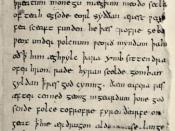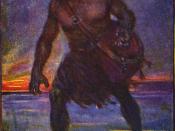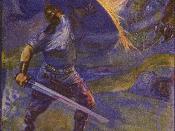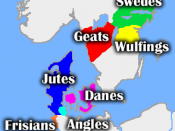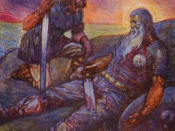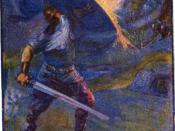Beowulf, one of the most translated and reproduced epics of all time is literature with historical background. It tells us about the way Germanic tribes of Scandinavia thought about their society. The Scandinavian decent tribes depicted in the epic poem, Beowulf, extend from about 450 to 1066. These tribes of Scandinavia were able to take over England in the fifth century after the Romans withdrew. With them they brought a language that is the base of the modern day English, religion, social divisions, and a relatively advanced society. All of these qualities are illustrated in this epic poem Beowulf.
Beowulf reflects a society with an advanced understanding in the value of a good king or queen. One way they displayed this great respect was with intriguing burial ceremonies. If you notice Beowulf begins and ends with the funeral of a great king. The Scylding King is laid to rest, "They stretched their beloved lord in his boat/ the mass treasure loaded on top of him it would travel far on out into the ocean's way" (lines 34-42).
In the end, Beowulf is burned "Many people of importance in the land, to fetch wood for the good man's pyre/ Now shall flame consume our leader" (lines 3113-3117). All these ceremonial traditions were very customary to Germanic tribes even if it were cremating or returning their warrior to the sea.
The Germanic social system was established with loyalty and personal appreciation as major concepts. The personal appreciation, or the will to be debt free, was highly demonstrated by Beowulf in this poem. Throughout the story the people needed many aspects to overcome disaster like strength, determination, and courage. The epic poem describes the roots of a Scandinavian culture hero, in this case Beowulf, in destroying the monster Grendel, Grendel's mother, and a fire breathing dragon. In this order Beowulf is shown not only as a glorious hero but also as a savior of the people. "They said that of all the kings upon the earth he was the man most gracious and fair-minded, kindest to his people and keenest to win fame" (lines 3180-3183). The only thing that bothered me was when they were about to fight the dragon Beowulf was left alone, he shouldn't be alone, he should rely on the fortitude and loyalty of his fellow tribesman. "The hand-picked troops broke ranks and ran for their lives to the safety of the wood" (lines 2597-2599). But this mutual loyalty is evoked between the leader and his followers when they desert him in this climatic battle where Beowulf sacrifices his life against the dragon.
Finally, Beowulf describes this Scandinavian society converting to Christianity. The tribes, while living on the continent Europe, based their beliefs and ideals on greater and lesser deities. These deities could be of forces of nature or of the supernatural which they understood in terms of animal or human superior strength. A mixture of pagan and Christianity worshipping are evident in Beowulf. Christianity is displayed with this quote "the harp being struck and the clear song of skilled poet telling the mystery of a man's beginnings, how the Almighty had made the earth" (lines 89-92). Although these tribes were leaning towards Christianity, they still had links to paganism.
Beowulf functions as a historical document to depict a collection of Germanic societies. Beowulf also reflects a society with a prominent understanding of the values of civilization. Although these advanced Germanic tribes of the eighth century converted to Christianity they should still look at its Scandinavian past with pride. Without this epic poem we would have a gap in our history when it comes to society in Scandinavian tribes.
